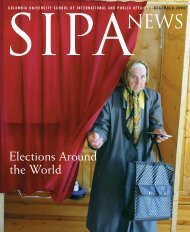Mozambique - School of International and Public Affairs - Columbia ...
Mozambique - School of International and Public Affairs - Columbia ...
Mozambique - School of International and Public Affairs - Columbia ...
Create successful ePaper yourself
Turn your PDF publications into a flip-book with our unique Google optimized e-Paper software.
<strong>Mozambique</strong>: Mobilizing Extractive Resources for Development May 2013<br />
monitoring <strong>of</strong> <strong>of</strong>fshore oil <strong>and</strong> gas operations. Moreover, the government should also pay attention to<br />
the potential environment disasters, which can trigger civil strife.<br />
Investment Regulation<br />
Furthermore there needs to be detailed environmental regulations on investment in hydrocarbons. This<br />
is an essential point for <strong>Mozambique</strong>’s future sustainable development. The Government <strong>of</strong><br />
<strong>Mozambique</strong> could establish a national inter-ministerial extractive industry committee <strong>and</strong> appoint a<br />
chairperson. It should deal with planning, contacting, SEAs, transparency <strong>and</strong> enforcement <strong>of</strong> laws.<br />
Moreover, the committee should insist that companies repair all possible damages after any accident.<br />
The lawmakers should also ensure that a certain percentage <strong>of</strong> natural gas revenue goes into renewable<br />
energy investment.<br />
PSSA Protection<br />
The sixth concern is how to deal the particularly sensitive sea areas (“PSSAs”). PSSAs could help reserve<br />
fishery resources by providing extra protection to wetl<strong>and</strong>s, estuaries, mangrove forests <strong>and</strong> other<br />
habitats. The Government could apply for PSSAs at the <strong>International</strong> Maritime Organization. A gas<br />
project’s SEA process should also cover the identification <strong>of</strong> potential PSSAs. If there is a sensitive <strong>and</strong><br />
vulnerable site that is shared by two or more countries, all stakeholders should work together to<br />
develop a joint protective measures.<br />
The preceding six factors provide guidance on the most common environmental issues in <strong>of</strong>fshore oil<br />
<strong>and</strong> gas development.<br />
4.4 Recommendations for the Regulations on Offshore Natural<br />
Gas Exploration<br />
It is not unusual for a country such as <strong>Mozambique</strong> to face capacity constraints when encountering a<br />
boom in natural resource discoveries <strong>and</strong> the corresponding dramatic growth in foreign direct<br />
investment. The same issue applies to the well-developed economy too. For the U.S., the 2010’s BP<br />
deep water horizon oil spill is an example that, even for country with one <strong>of</strong> the most sound legal<br />
systems in the world, it still faces the challenges <strong>of</strong> properly regulating <strong>and</strong> monitoring on its own<br />
extractive industry. Since recent <strong>of</strong>fshore oil <strong>and</strong> gas production is based on technology that has not<br />
been mastered by many companies, the risk <strong>of</strong> accident is actually much higher than the onshore<br />
production.<br />
Based on our interviews <strong>and</strong> legal research, the <strong>Mozambique</strong> government has no administrative<br />
legislation on international oil company (IOCs) <strong>of</strong>fshore drilling activities. Thus the government actually<br />
has no risk control to these <strong>of</strong>fshore drilling activities. Lawmakers might not have difficulty to introduce<br />
a complete regulation on the <strong>of</strong>fshore natural gas drilling in time for investments <strong>and</strong> exploration from<br />
foreign companies. However, it is necessary <strong>and</strong> possible for the <strong>Mozambique</strong> government to make the<br />
reference to the laws <strong>of</strong> other countries. By requiring the IOCs to use the international drilling st<strong>and</strong>ard,<br />
<strong>Mozambique</strong> could greatly reduce the risk <strong>of</strong> <strong>of</strong>fshore drilling accident.<br />
Below are examples <strong>of</strong> three countries for <strong>Mozambique</strong> legislative <strong>and</strong> administrative bodies’ reference.<br />
113

















